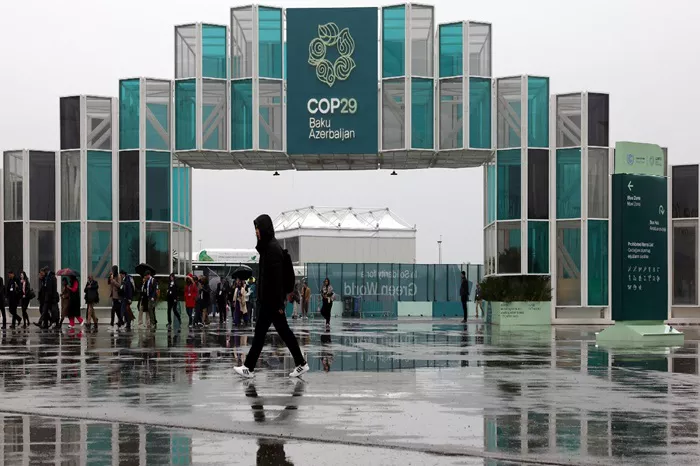Saudi Arabia’s involvement in COP29 has stirred significant controversy, as the nation has been accused of actively undermining the commitments made at last year’s climate summit regarding the global transition away from fossil fuels. Several days before the summit’s conclusion, Saudi officials’ tactics to derail critical discussions on fossil fuel reliance have caused alarm among climate activists and diplomats, who are concerned about the kingdom’s increasing obstruction.
While Saudi Arabia previously endorsed the COP28 pledge to move away from fossil fuels, reports indicate a shift in its approach. The country is now taking aggressive steps to block key dialogues aimed at reducing fossil fuel dependence, with reports of deliberate interference in at least five U.N. forums this year. Anti-fossil fuel advocates warn that Saudi Arabia’s efforts represent a serious threat to global climate progress, given the nation’s prominent role as one of the world’s leading oil producers.
Andreas Sieber from 350.org highlighted the scale of Saudi Arabia’s influence, noting, “For the number-one petrostate in the world, that’s quite a threat.” His concerns underscore how Saudi Arabia’s obstruction could undermine the Paris Agreement’s goals to limit global warming to 1.5°C, especially by weakening the focus on necessary mitigation strategies.
Reports from Hanen Keskes of Greenpeace MENA confirm that Saudi Arabia has taken a hardline stance, particularly regarding the Mitigation Work Programme (MWP), a key initiative aimed at reducing fossil fuel consumption. Keskes remarked that while other negotiations have seen slow progress, Saudi Arabia’s tactics have significantly delayed any substantive action, often using procedural maneuvers to postpone or block discussions.
A major point of contention at COP29 is climate finance, with developing countries—Saudi Arabia among them—insisting on annual financial commitments ranging from USD 1 trillion to USD 1.3 trillion to meet their climate obligations. These funds are crucial for vulnerable nations to address the impacts of climate change. Without these financial commitments, the ambitious goals outlined in national climate plans risk failing.
While Saudi Arabia is not alone in its resistance to the transition from fossil fuels, the extent of its obstruction this year is unprecedented. At COP28, Saudi officials made attempts to disrupt consensus on fossil fuel transition, often employing tactics like lengthy statements and inserting controversial language into draft agreements. While they eventually yielded to pressure from smaller island nations and agreed to a watered-down statement on the transition, skepticism remains about their true commitment to the cause.
Statements from Saudi Energy Minister Abdulaziz bin Salman further fuel the uncertainty. He has repeatedly dismissed the idea of phasing out oil and gas as unrealistic, calling it a “fantasy.” His rhetoric signals Saudi Arabia’s intention to continue prioritizing fossil fuel use, despite growing global calls for action on climate change.
The kingdom’s influence extends beyond COP29, as it has successfully impeded discussions on fossil fuel extraction at other U.N. gatherings, such as the U.N. nuclear conference and biodiversity meetings. In these forums, the connection between fossil fuel extraction and ecosystem degradation was often downplayed or avoided due to Saudi pushback, illustrating the growing challenges facing global climate coordination.
Some analysts suggest that Saudi Arabia’s assertive tactics reflect broader geopolitical shifts, particularly the influence of the U.S. under the Trump administration, which was less committed to climate agreements. This shift has emboldened fossil fuel-dependent nations like Saudi Arabia to assert their interests more aggressively on the global stage.
U.N. procedures, which require consensus among participating nations for any agreements, give countries like Saudi Arabia the power to disrupt global climate efforts. Diplomatic sources at COP29 have voiced frustration over Saudi Arabia’s obstruction, describing it as a destructive force preventing progress on essential topics like carbon markets and decarbonization pathways.
Joanna Depledge from the University of Cambridge emphasized the unusual nature of Saudi Arabia’s objections, stating, “It’s literally a flat ‘no’ with little effort to justify or engage with alternative perspectives.” This lack of constructive dialogue is hindering the ability of negotiators to craft actionable climate solutions, deepening the divisions between nations on critical issues such as financing and the role of fossil fuels in future climate strategies.
As COP29 progresses, tensions continue to rise. The lack of collaboration and mounting frustration among delegates highlight the widening rift between wealthy nations hesitant to commit to climate finance and developing countries demanding urgent support. With global climate targets at risk, the stakes at COP29 could have far-reaching consequences for the future of the planet.
In conclusion, the dynamics at COP29 reflect a growing battle between the ambitions of global climate action and the entrenched interests of fossil fuel-dependent nations. With Saudi Arabia at the forefront of these efforts, there are rising concerns that the summit’s outcomes may fail to deliver on the urgent climate pledges made under the Paris Agreement. The world is watching closely as the fate of the planet hangs in the balance.
Related topic:
What Is Oil Made Out Of Fossil Fuels?

